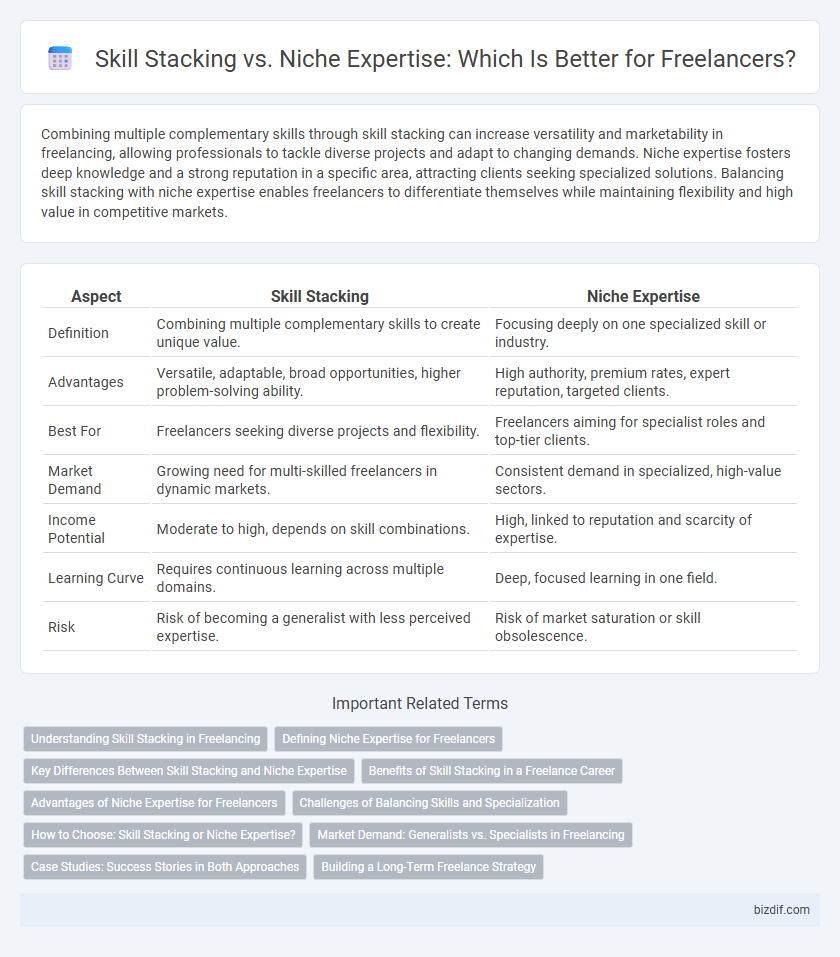Combining multiple complementary skills through skill stacking can increase versatility and marketability in freelancing, allowing professionals to tackle diverse projects and adapt to changing demands. Niche expertise fosters deep knowledge and a strong reputation in a specific area, attracting clients seeking specialized solutions. Balancing skill stacking with niche expertise enables freelancers to differentiate themselves while maintaining flexibility and high value in competitive markets.
Table of Comparison
| Aspect | Skill Stacking | Niche Expertise |
|---|---|---|
| Definition | Combining multiple complementary skills to create unique value. | Focusing deeply on one specialized skill or industry. |
| Advantages | Versatile, adaptable, broad opportunities, higher problem-solving ability. | High authority, premium rates, expert reputation, targeted clients. |
| Best For | Freelancers seeking diverse projects and flexibility. | Freelancers aiming for specialist roles and top-tier clients. |
| Market Demand | Growing need for multi-skilled freelancers in dynamic markets. | Consistent demand in specialized, high-value sectors. |
| Income Potential | Moderate to high, depends on skill combinations. | High, linked to reputation and scarcity of expertise. |
| Learning Curve | Requires continuous learning across multiple domains. | Deep, focused learning in one field. |
| Risk | Risk of becoming a generalist with less perceived expertise. | Risk of market saturation or skill obsolescence. |
Understanding Skill Stacking in Freelancing
Skill stacking in freelancing involves combining multiple complementary skills to create a unique value proposition that sets freelancers apart from competitors. This approach enables professionals to tackle diverse client needs and adapt to evolving market demands, increasing their overall marketability and earning potential. Unlike niche expertise, which focuses on deep knowledge in a single area, skill stacking leverages breadth and versatility to solve complex problems and open broader freelance opportunities.
Defining Niche Expertise for Freelancers
Niche expertise for freelancers involves developing deep knowledge and specialized skills within a specific industry or service area, such as graphic design for healthcare marketing or SEO for e-commerce websites. This focused proficiency enables freelancers to command higher rates and attract clients seeking tailored solutions that generalists cannot provide. Mastering a niche builds credibility, fosters repeat business, and differentiates freelancers in competitive marketplaces like Upwork or Fiverr.
Key Differences Between Skill Stacking and Niche Expertise
Skill stacking involves combining multiple complementary skills to create unique value and adaptability across diverse projects, whereas niche expertise centers on deep specialization in a single, focused area. Freelancers leveraging skill stacking tend to attract clients seeking versatile problem solvers, while niche experts command higher rates for their specialized knowledge. Understanding these key differences helps freelancers strategically position themselves in competitive markets to maximize income and opportunities.
Benefits of Skill Stacking in a Freelance Career
Skill stacking empowers freelancers by combining diverse competencies like graphic design, copywriting, and digital marketing, enhancing versatility and marketability. This approach increases earning potential as clients seek multifaceted professionals capable of handling various project aspects efficiently. Freelancers with stacked skills adapt quickly to industry changes, securing a competitive edge and expanding opportunities across multiple sectors.
Advantages of Niche Expertise for Freelancers
Niche expertise empowers freelancers to command higher rates by positioning themselves as specialists in a specific field, attracting clients seeking targeted solutions. Deep knowledge and experience within a focused area enhance credibility and lead to stronger client trust and repeat business. Specialization also streamlines marketing efforts, making it easier to identify and reach ideal clients efficiently.
Challenges of Balancing Skills and Specialization
Freelancers often face challenges balancing skill stacking and niche expertise, as developing multiple competencies can dilute focus, while deep specialization may limit market opportunities. Maintaining a competitive edge requires strategic prioritization of skills that complement core expertise without overwhelming capacity. Navigating client demands and evolving industry trends further complicates sustaining this equilibrium for long-term success.
How to Choose: Skill Stacking or Niche Expertise?
Choosing between skill stacking and niche expertise depends on market demand and individual goals; skill stacking combines complementary abilities to create a unique value proposition, while niche expertise focuses on deep knowledge in a specific area to become a go-to specialist. Freelancers should assess industry trends, client needs, and their adaptability to decide whether broad versatility or specialized mastery offers better opportunities. Evaluating competition and potential income streams helps determine if diversifying skills or honing expertise aligns best with long-term career growth.
Market Demand: Generalists vs. Specialists in Freelancing
Freelancers with skill stacking attract diverse market demand by offering a broad range of complementary abilities, making them adaptable to various projects and client needs. Specialists, however, fulfill high-demand niche markets where deep expertise commands premium rates and reputation-driven opportunities. Balancing market demand, freelancers who combine core specialization with versatile skills often maximize both job volume and income potential.
Case Studies: Success Stories in Both Approaches
Freelancers who leverage skill stacking, combining complementary abilities like graphic design and digital marketing, have increased project opportunities and higher client retention, as seen in case studies of professionals scaling up their freelance businesses quickly. Niche experts, such as cybersecurity specialists or blockchain developers, command premium rates and attract long-term contracts by positioning themselves as go-to authorities within specific industries. These success stories reveal that both approaches can drive profitability and career growth, with skill stacking enhancing versatility and niche expertise boosting market authority.
Building a Long-Term Freelance Strategy
Skill stacking combines diverse, complementary abilities to offer unique value, enhancing adaptability in fluctuating freelance markets. Niche expertise establishes deep authority and command over specialized sectors, attracting high-value clients seeking expert solutions. For a sustainable freelance career, blending skill stacking with focused niche mastery enables consistent growth, client trust, and competitive differentiation.
Skill Stacking vs Niche Expertise Infographic

 bizdif.com
bizdif.com